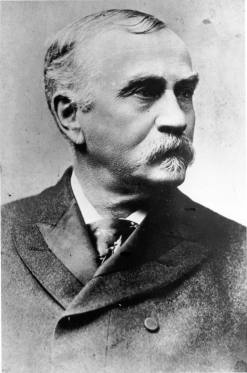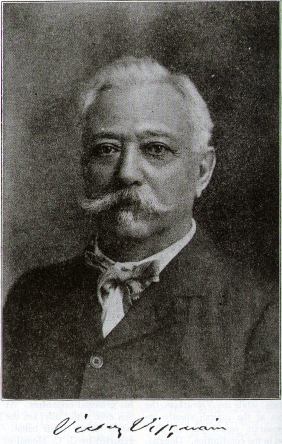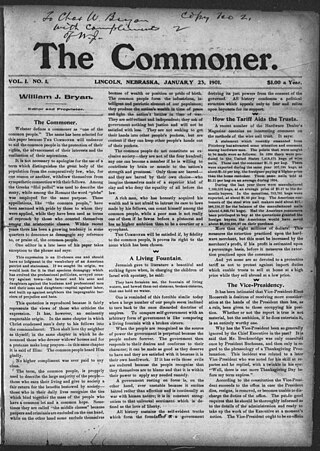
The Conservative was a weekly newspaper devoted to the discussion of political, economic, and sociological questions published in Nebraska City, Nebraska, by Julius Sterling Morton.

The Conservative was a weekly newspaper devoted to the discussion of political, economic, and sociological questions published in Nebraska City, Nebraska, by Julius Sterling Morton.
The Conservative was first issued on July 14, 1898 by the Morton Printing Company. [1] The publication was not dedicated to news but acted as a journal of political discussion. During the last two years of publishing, Morton would use The Conservative as a forum through which to disagree and criticize his rival Nebraska Democrat William Jennings Bryan and his publication, The Commoner . In the first issue of The Conservative, the letter from the editor stated that the paper would be a defender of the individual and critical of big government. In addition, the paper also served as a platform for Morton to campaign for the formation of a third Conservative Party, which he believed was necessary to realign the environment of American politics.
Issued every Thursday The Conservative was printed in a magazine-style three-column format that ranged from ten to twenty printed pages per issue. [2] Although the paper was published for only four years, The Conservative included many notable contributors like Robert W. Furnas, Carl Shurz and Dr. George L. Miller. [3]
Morton remained at the helm of the paper until poor health forced him to turn over editorship to his son, Paul Morton, on April 24, 1902. The last issue of The Conservative was published on May 29, 1902 and consisted mainly of tributes to the deceased Julius Sterling Morton.

The Hindu is an Indian English-language daily newspaper owned by The Hindu Group, headquartered in Chennai, Tamil Nadu. It began as a weekly in 1878 and became a daily in 1889. It is one of the Indian newspapers of record and the second most circulated English-language newspaper in India, after The Times of India. As of March 2018, The Hindu is published from 21 locations across 11 states of India.
Yellow Dog Democrats is a political term that was applied to voters in the Southern United States who voted solely for candidates who represented the Democratic Party. The term originated in the late 19th century. These voters would allegedly "vote for a yellow dog before they would vote for any Republican". The term is now more generally applied to refer to any Democrat who will vote a straight party ticket under any circumstances. The South Carolina Democratic Party and Mississippi Democratic Party, among other state parties, continue to use the phrase to refer to committed members of the Democratic Party in the "Yellow Dog Club".

The Territory of Nebraska was an organized incorporated territory of the United States that existed from May 30, 1854, until March 1, 1867, when the final extent of the territory was admitted to the Union as the state of Nebraska. The Nebraska Territory was created by the Kansas–Nebraska Act of 1854. The territorial capital was Omaha. The territory encompassed areas of what is today Nebraska, Wyoming, South Dakota, North Dakota, Colorado, and Montana.

The Daily Nebraskan, established in 1871 as the Monthly Hesperian Student, is the student newspaper of the University of Nebraska–Lincoln. Although many journalism students are on staff, the Daily Nebraskan is independent of the university's College of Journalism and Mass Communications. The newspaper is entirely student-produced and managed, and has a professional general manager, Allen Vaughan, who joined in July 2019 after the retirement of Dan Shattil, who retired in October 2019 after 37 years at the helm.

Julius Sterling Morton was a Nebraska newspaper editor and politician who served as President Grover Cleveland's Secretary of Agriculture. He was a prominent Bourbon Democrat, taking a conservative position on political, economic, and social issues, and opposing agrarianism. Among his most notable achievements was the founding of Arbor Day in 1872. In 1897 he started a weekly magazine entitled The Conservative.
The Lincoln Journal Star is an American daily newspaper that serves Lincoln, Nebraska, the state capital and home of the University of Nebraska. It is the most widely read newspaper in Lincoln and has the second-largest circulation in Nebraska. The paper also operates a commercial printing unit.

This is a list of more than 1,100 properties and districts in Nebraska that are on the National Register of Historic Places. Of these, 20 are National Historic Landmarks. There are listings in 90 of the state's 93 counties.

Robert Wilkinson Furnas was the second governor of Nebraska. Born near Troy, Ohio, and orphaned at the age of eight Furnas was a self-made man. He worked as a farmer, printer, tinsmith, insurance salesman, and postmaster all before getting into politics. He married Mary Elizabeth McComas on October 29, 1845, who died in 1897; and his second was Susannah Emswiler Jameson. He had eight children.

Samuel Roy McKelvie was an American politician from the U.S. state of Nebraska. McKelvie served as the 19th governor of Nebraska, from 1919 to 1923. He was also the 13th lieutenant governor of Nebraska, from 1913 to 1915.

The Oregon Spectator, was a newspaper published from 1846 to 1855 in Oregon City of what was first the Oregon Country and later the Oregon Territory of the United States. The Spectator was the first American newspaper west of the Rocky Mountains and was the main paper of the region used by politicians for public debate of the leading topics of the day. The paper's motto was Westward the Star of Empire takes its way.
Eli Seavey Ricker was a corporal serving the Union Army during the American Civil War, newspaper editor, rancher, judge, and activist known for his support of Native Americans and other social causes. He was one of the first historians to recognize the validity of the Native American views.

Jean-Baptiste Victor Vifquain was a Belgian-born veteran of the American Civil War and the Spanish–American War. He was awarded the Medal of Honor for capturing a Confederate flag during the Battle of Fort Blakely. Following the Civil War, Vifquain was appointed as US consul to Colombia and was inducted into the Order of the Double Dragon for rendering aid to Chinese citizens.

The Commoner was a weekly newspaper published in Lincoln, Nebraska, from 1901 to 1923 that was owned, edited, and published by William Jennings Bryan. The Commoner was a political paper of the early twentieth century that impacted a great deal of public opinion on critical matters.

The Capital City Courier was a newspaper established on December 9, 1885, by L. Wessel in Lincoln, Nebraska, to support local establishments. It was known in its early years as a society builder paper with sections of the paper devoted to literature, music, home architecture, religion, humor, drama, sports, and correspondences or current events.

The Nebraska Farmer was the first agricultural publication in the state and is, at present, one of the oldest run journals in Nebraska. This publication is still highly influential in the making of agricultural policies and procedures in Nebraska and surrounding Great Plains states. It is owned by media company Penton.
Will M. Maupin (1863–1948) was a newspaper man from Nebraska who worked for papers like the Omaha World-Herald, The Commoner, and the Hastings Democrat.

The 1952 Nebraska gubernatorial election was held on November 4, 1952, and featured former Lieutenant Governor Robert B. Crosby, a Republican, defeating Democratic nominee, former state Senator Walter R. Raecke.

The 1934 Nebraska gubernatorial election was held on November 6, 1934, and featured state engineer Robert L. Cochran, a Democrat, defeating Republican nominee, newspaper publisher and former state legislator Dwight Griswold.

The 1932 Nebraska gubernatorial election was held on November 8, 1932, and featured incumbent Governor Charles W. Bryan, a Democrat, defeating Republican nominee, newspaper publisher and former state legislator Dwight Griswold, to win a third and final two-year, non-consecutive term in office.

The 1922 Nebraska gubernatorial election was held on November 7, 1922, and featured former Mayor of Lincoln Charles W. Bryan, a Democrat, defeating Republican nominee, state Senator Charles H. Randall.
{{cite web}}: CS1 maint: unfit URL (link){{cite web}}: CS1 maint: unfit URL (link)Katherine, Walter. "The Conservative". Nebraska Newspapers. University of Nebraska-Lincoln. This site allows users the ability to read all of the issues of The Conservative as they were published from 1898 to 1902, in PDF format, and view the associated images.